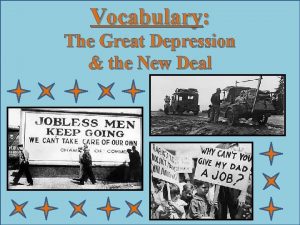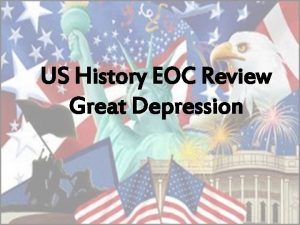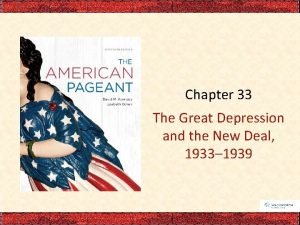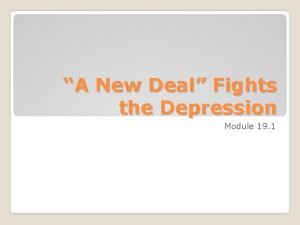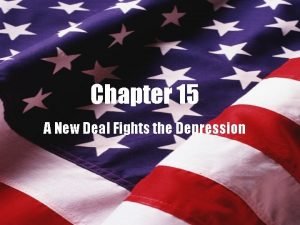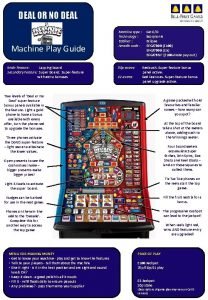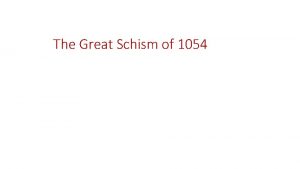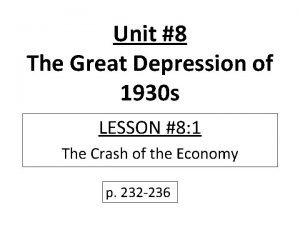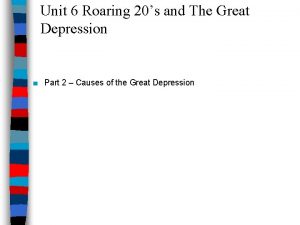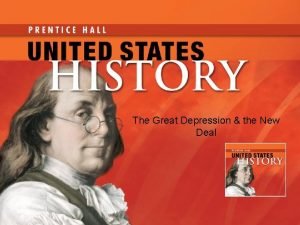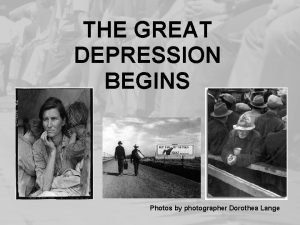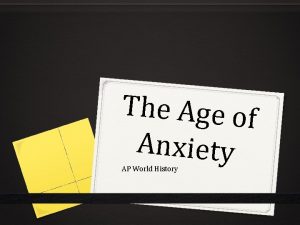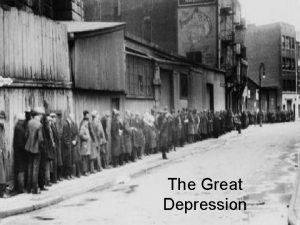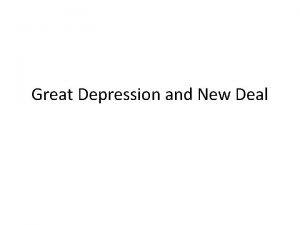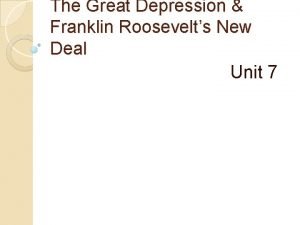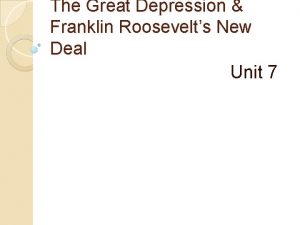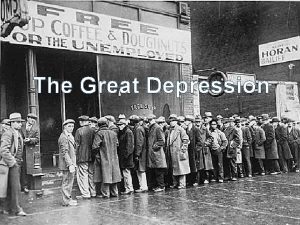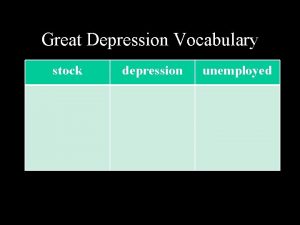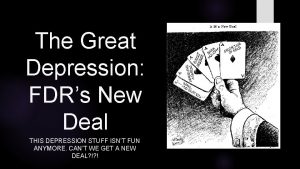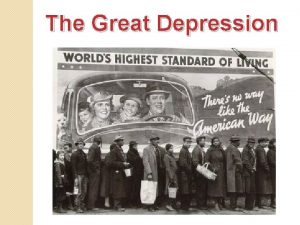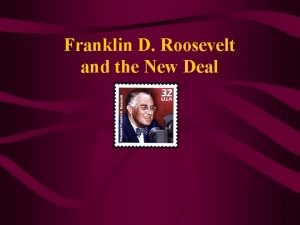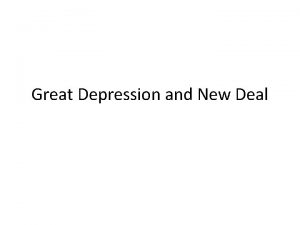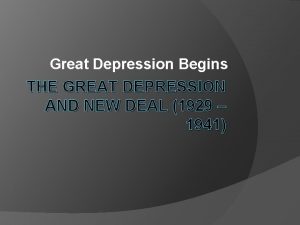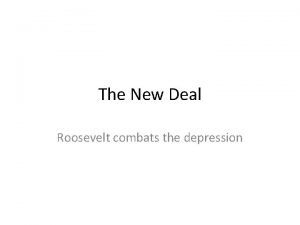The New Deal THE GREAT DEPRESSION Franklin D

















- Slides: 17

The New Deal THE GREAT DEPRESSION

Franklin D. Roosevelt ● Born January 11, 1882 ● Came from wealth. Harvard University, and Columbia Law School. ● Married Eleanor at 23. ● Diagnosed with polio in 1921. ● In 1928, he was elected governor of NY. ● Seen as a compassionate and caring man. ● FDR was reelected for four terms and died in office in 1945.

What is taking place in this picture? What is Roosevelt’s “inheriting”?

The 1932 Election ● Balanced budget, lowering taxes ● Felt direct government aid demeaned proud Americans and they would become dependant on welfare. ● Caring for the American people should be a local and voluntary responsibility, not that of the federal government. ● Many believed the Depression was Hoover’s fault ● Not balanced budget, raising taxes. He felt that it was the federal government’s responsibility to care for the poor. ● He said in his campaign: “I pledge you, I pledge myself, to a new deal for the American people. ” ● However, he said little about the specifics of his plan. ● He also ran on a platform to end prohibition.

Electoral College Results: Herbert Hoover (Incumbent): 59 Electoral Votes Franklin Roosevelt (Challenger): 472 Electoral Votes

Presidential Responses In the presidential election of 1932, candidate Franklin D. Roosevelt promised Americans a “New Deal” to help the nation recover from the Depression. As a result, he was elected. 1929 1933 1932 1939 1941

FDR’s Efforts ● Bank Holiday ● 100 Days ● Brain Trust ● Fireside Chats ● Hope (What do we have to fear? ) ● New Deal Programs Why do you think Roosevelt's’ administration chose to call his radio addresses fireside chats? Click Here to watch a video about Fireside Chats.

Fireside Chat on Bank Holiday My friends. . . when you deposit money in a bank, the bank does not put the money into a safe deposit vault. It invests your money, puts it to work. . . [Why did banks go out of business? ] There was a general rush so great the soundest banks could not get enough currency to meet the demand. . [Then he described the plan to gradually reopen banks. ] There is no occasion for worry. . When people find they can get their money, the phantom of fear will soon be laid [to rest]. I can assure you that it is safer to keep your money in a reopened bank than under the mattress.

The New Deal ● FDR’s plan to combat the Great Depression. It was a combination of acts and programs that sought relief, recovery, and reform for the American People.

New Deal Investigation Direction: Examine the various New Deal Programs with your group. Use the information to answer the following questions. You will use your knowledge to complete a “group quiz” at the end of the block. 1. Why was this program created? Link it directly to a cause or impact of the Great Depression that needed addressing. 2. What strategy did this program take to solve the problem? Make it clear how the strategy was linked to the reason why the program was created. 3. What are the outcomes of this program, including what affect this program has today?

FDR’s Domestic Legacy HE INCREASED THE POWER OF THE PRESIDENCY AND EXPANDED THE FEDERAL GOVERNMENT. DEFICIT SPENDING

Hoover Roosevelt Self-Reliant, volunteerism Decisive, action watching, waiting, hoping Building, working, relieving “Dole will ruin spirit” “only fear, fear itself” Indirect Direct

Which statement best describes the difference in how Presidents Hoover and Roosevelt handled the effects of the Great Depression? A. Hoover wanted to directly help the people while FDR maintained an attitude of self-reliance. B. FDR wanted immediate and direct help for the American people while Hoover maintained an attitude of self-reliance. C. Both felt that a better educated public would have stopped the Great Depression D. Hoover felt that the United States Government was the best equipped to handle this depression.

What ended the Depression?

● While FDR provided Americans hope other nations turned to strong leadership to help combat the effects of their depression. ● Some became dictators.

New Deal Remedies 1. Who are three people depicted in this cartoon? How do you know who they are? 1. What do some of the abbreviations stand for? Name two. 1. What is ironic about the “New Deal Remedies” bag? 1. How is Roosevelt depicted by the illustrator? 1. Do you think this cartoon is optimistic or pessimistic of the “New Deal” Programs? Explain.

Time to Assess!
 Vocabulary review causes of the depression
Vocabulary review causes of the depression What is the main idea of the cartoon?
What is the main idea of the cartoon? Chapter 33 the great depression and the new deal
Chapter 33 the great depression and the new deal A new deal fights the depression
A new deal fights the depression The new deal fights the depression
The new deal fights the depression A great deal vs a great many
A great deal vs a great many Deal or no deal machine
Deal or no deal machine Rudolf vizental
Rudolf vizental Fundamental english structure
Fundamental english structure What was the deal breaker in the great schism
What was the deal breaker in the great schism Rarig great depression
Rarig great depression Great depression
Great depression The ingenious quarterback analysis
The ingenious quarterback analysis Foreclosure great depression
Foreclosure great depression Five effects of the great depression
Five effects of the great depression Five effects of the great depression
Five effects of the great depression How did the great depression impact the world
How did the great depression impact the world What is the dawes plan
What is the dawes plan
